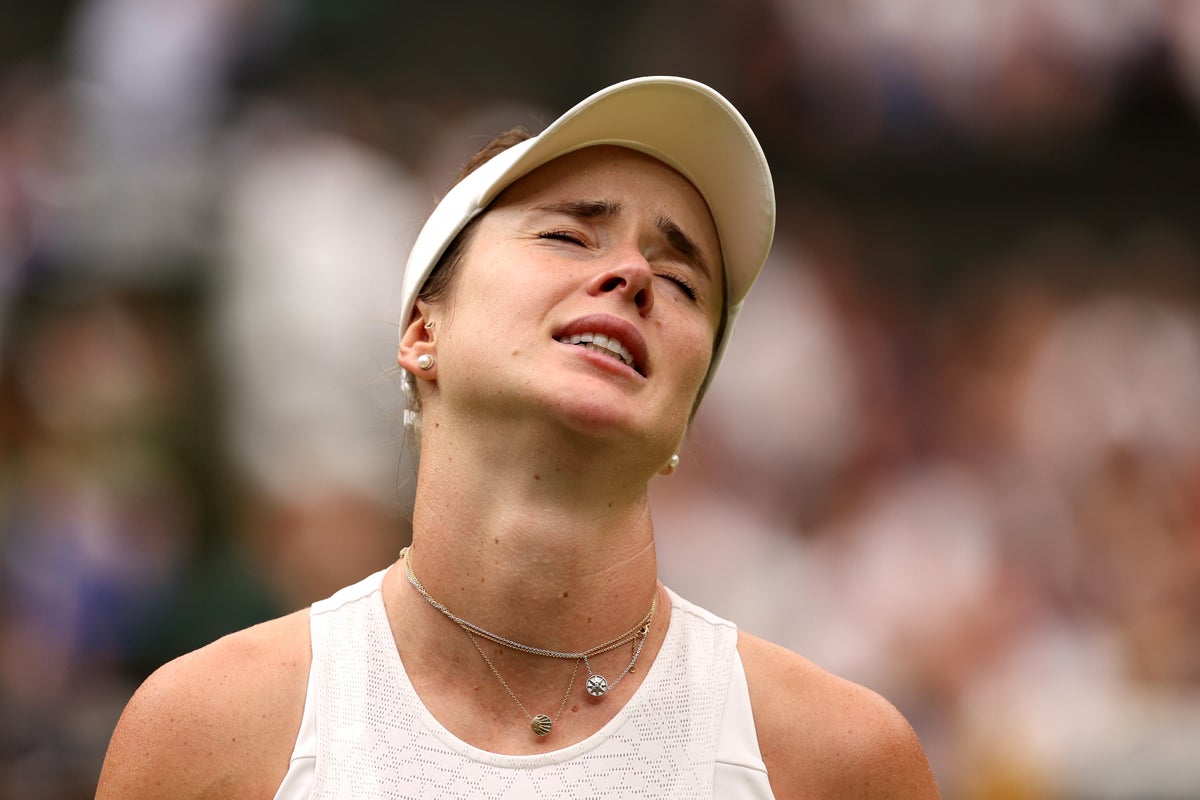
During an intense two weeks, the tennis court became Elina Svitolina’s sanctuary from outside noise. Her simple stand of refusing to shake hands with Russian and Belarusian players took on heightened scrutiny at Wimbledon, a place where etiquette is sacred. The spotlight brought with it relentless questions, and an insatiable lust for her emotions.
Soldiers are dying on the front line, what’s your message for them? The UK is supporting Ukraine, what’s your message for us? Harry Styles has offered you tickets to his concert, what’s your message for him?
Here on Thursday, after a bruising semi-final defeat by Marketa Vondrousova, who pulled her all over the court with a tormenting array of spinning slices, deep groundstrokes and disguised drop shots, Svitolina broke down.
“It’s a lot of responsibility, a lot of tension,” she said through tears. “I tried to balance as much as I can, but sometimes it gets too much.”
She was turned into a totem: a symbol of what a new mother can achieve, and the embodiment of a defiant nation’s spirit. More weirdly, amid the stream of searching questions, she was often prompted to give thanks and be grateful, as if satisfying a certain sort of Western saviour complex.
What do you have to say to the Centre Court crowd? “They supported me all the way though, even when I was down I got a lot of support. I’m really thankful.”
What message does your performance, send to people all over the world? “Continue dreaming,” she said, tearing up again. “Never stop having dreams.”
How would you feel if a Belarusian won Wimbledon? “I am not in a good state of mind to answer this question,” she batted back.
And emotional Elina Svitolina walks off after losing to Marketa Vondrousova (Steven Paston/PA)— (PA Wire)
For Svitolina, Wimbledon presented an odd dichotomy. On the one hand, she had never cared less about tennis. Her priorities were her young daughter and family, her ravaged country and its people, before her sport. Her city, Odessa, has been at the bloody heart of Russia’s invasion of Ukraine. And yet with each match and interview and press conference and new handshake-gate, the weight of others’ hopes grew heavier.
“I’m really upset that I couldn’t go further,” she said. “I’m really disappointed with the performance that I showed today. I need a couple of days to reflect on everything.”
She joked through the tears that it had at least been a better performance than her last Wimbledon semi-final. Then, in 2019, Svitolina crumbled against eventual champion Simona Halep.
This time she was different in so many ways: after her break to give birth to baby Skai, she changed her coaching team, her racket and even the type of strings she used. She plays more boldly and aggressively than ever. The beaten world No 1 Iga Swiatek said their quarter-final was like facing a whole new player.
Life is different now too. “War has changed me,” Svitolina said this week. “Every moment that I’m not on the court I’m checking how my family is doing, how the situation is in Ukraine, monitoring all the time what is happening … this is pretty much the life that I have now.”
And so the court offered some respite from the questions she asked, and the questions being asked. Each time she walked off she would Facetime her husband, the French player Gael Monfils, and their daughter, who was usually more interested in eating ice cream than the result of her match. Svitolina will turn down the chance to go and see Harry Styles in order to reunite with her family at home in Miami.
After returning to the tour in April, she has now reached the French Open quarter-finals and Wimbledon semis, with the final slam of the year – the US Open – to come in September. She has been to three major career semi-finals, getting closer to becoming the first Ukrainian woman to win a grand slam singles title. “I really hope I can build on this,” she said.
First, she will take some time to recover from a slam like no other. “I’ll need a couple of days to really reflect on everything, to really switch myself off from everything, and think about what happened.”







